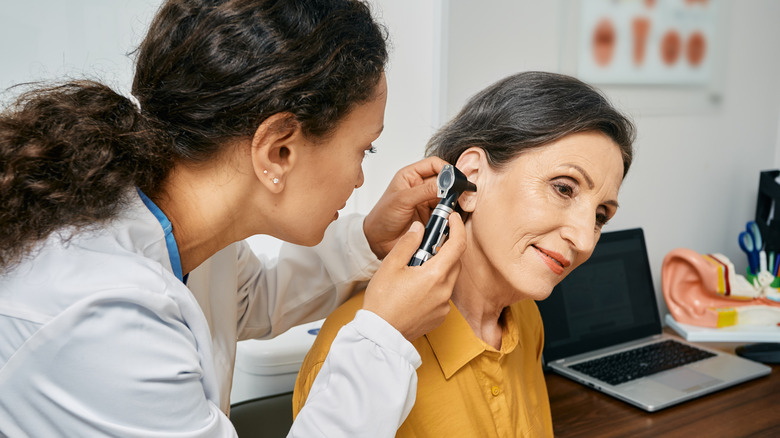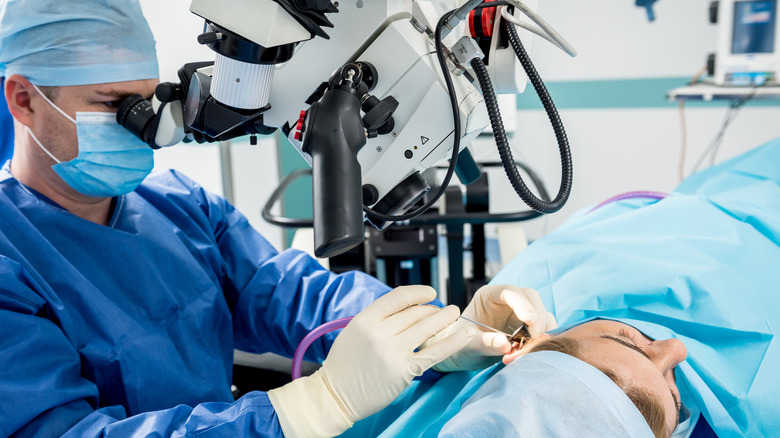Ménière's Disease: A Comprehensive Guide
Chances are you've never heard of Ménière's disease. It's a progressive inner ear disorder that affects hearing and is known for severe episodes of vertigo. It's a relatively rare condition — between 600,000 to 750,000 Americans have it, according to the Hearing Health Foundation, or about 12 out of every 1,000 people worldwide.
The American Hearing Research Foundation explains that calling Ménière's a "disease" is a bit of a misnomer. Instead, it's really more of a "cluster of symptoms" and, boy, those symptoms can be incapacitating. The hallmark sign of vertigo usually comes on suddenly and leaves sufferers intensely dizzy and nauseated even if they're sitting in a chair or laying down. The other key challenges are usually one-sided hearing loss that makes a constant ringing in the ears (it's called tinnitus), as well as pressure or a feeling of fullness deep inside the ear.
A lot of times people think they have Ménière's because they get repeated dizzy spells, but as Michigan Medicine otolaryngologist Dr. Gregory Basura says, "If you don't have that spectrum of symptoms, then you don't meet the criteria" (via AARP).
What causes the condition?
Your inner ear is a complex network of loop-shaped canals that contain fluid and hairlike sensors, and they all work together to keep you in balance, according to the Mayo Clinic. "When you move your head, the fluid inside the tubes kind of flows a little bit," explains neuroscientist Paul DiZio, Brandeis University who studies balance, motion, and dizziness. "And then you've got these sensors — sensors that are like little pieces of seaweed inside the tubes — that kind of float with the fluid and sense what's going on," DiZio told Live Science.
But when there's a hiccup with those detectors in your inner ears, that's when things get weird. For someone with Ménière's disease, they suffer extreme episodes of rotational (spinning) vertigo that causes them to lose their equilibrium. Additionally, there's ringing in the ears, ear pressure, and fluctuating hearing loss, explains the American Hearing Research Foundation.
The condition was once thought to be a strictly brain-related disorder (per Journal of the American Medical Association), but in the 19th century, a French physician Prosper Ménière discovered that the debilitating symptoms actually originate in the inner ear.
Those who are affected by Ménière's disease
While Ménière's disease can strike at any age — though it rarely occurs in children — those who are "middle-aged" between 40 and 60 years old are most at risk, according to the National Institute on Deafness and Other Communication Disorders. If you're now a little worried that your occasional spells of dizziness might be a sign you have this progressive disorder, you'll be relieved to know that Ménière's is not likely to be the source. The Ear Surgery Information Center explains that many patients experiencing vertigo will often consult with ear surgeons about their symptoms, but few of those patients actually have the full plate of symptoms that define Ménière's disease.
Physicians, unfortunately, don't have a lot of answers as to why this disabling syndrome strikes mostly in middle age. Nor is it clear why people of any age get it at all. Most people who have fluid buildup in their inner ears have only temporary balance or ear fullness issues that never turn into full-blown Ménière's disease.
This is how the disease gets diagnosed
If your symptoms seem to fit the Ménière's profile, doctors have a lot of diagnostic tools available to them. However, there is no single definitive test. These tools include a battery of hearing and imaging scans, such as magnetic resonance imaging (MRI) and computerized tomography (CT) both of which can be used to examine the brain. Additional tests commonly ordered include an electronystagmogram (ENG), which measures eye movements, and a Dix-Hallpike test to determine if certain head motions are triggering your vertigo (per Stanford Medicine).
Multiple tests are needed because it's a complex syndrome that can have many causes. Lots of people get dizzy spells, but most are not caused by Ménière's disease. Additionally, doctors also need to get at the root of what patients actually mean when they say they've been feeling unwell and unbalanced. "Dizziness is one of the most common complaints we receive as neurologists. But what people mean when they say they're experiencing it is often unclear," Dr. David Perlmutter, a board-certified neurologist told Prevention.
But sometimes Ménière's disease is wrongly identified
You wouldn't want to get a diagnosis of Ménière's disease — or any other serious medical ailment — if you didn't really have it, right? That's why going to a specialist who knows the condition inside and out is so vitally important. Inner ear infections, severe allergies, or even migraines can be misdiagnosed as Ménière's. Your symptoms of vertigo, ear ringing, and one-sided hearing loss could also be caused by a secondary disorder such as hypothyroidism or even a nonmalignant tumor like an acoustic neuroma, according to Johns Hopkins Medicine.
"A number of recent studies examining the experiences of dizzy patients have indicated that doctors frequently diagnose it when they see any vertigo they don't understand, and there are patients diagnosed with Ménière's syndrome who simply never get evaluated for anything else," (per the British Journal of General Practice).
Ménière's disease affects the sense of balance
Unpredictability is the calling card of Ménière's disease. "[Those with Ménière's] feel dizzy and sick, their hearing is dominated by a hissing or roaring sound (tinnitus), and one or both ears feel full to bursting point," explains the Australian government's Better Health Channel. You might experience a particularly scary episode of prolonged dizziness one day, or a cluster of short attacks another day, and then feel pretty much normal for months or years, according to Eastern Virginia Medical School.
But when you are in the midst of a vertigo episode and the room feels like it's spinning around you – often nauseatingly so for hours — you're going to feel like there's nowhere to hide from this chronic syndrome. Sometimes, though uncommon, "drop attacks" may occur when sufferers completely lose their balance and fall as if they were violently pushed to the ground, the JAMA Network reports.
All of these balance problems, says U.K.'s National Health Service, will likely leave you feeling exhausted and out of control. Loss of balance, as well as potential loss of hearing, are arguably the worst and most depressing parts of Ménière's spectrum of symptoms (via the Mayo Clinic).
The condition may lead to permanent hearing loss
Though the condition is still not fully understood, it's thought that the repeated attacks suffered by Ménière's patients cause progressive impairment to hearing by damaging the inner ear's intricate structures. With this chronic disorder, fluid in the ear builds up, increasing pressure and causing chronic dizzy episodes and the feeling of ear fullness, explains U.K.'s Ménière's Society. However, when there is hearing loss or reduced ability to hear, the Icahn School of Medicine at Mount Sinai says it's usually just one ear that's affected — but that it can spread to both.
This was the case for Huey Lewis, founder and lead singer of the 1980s rock band Huey Lewis and the News. He's had Ménière's disease since the 1990s and told AARP during an interview that his hearing in one ear has gotten much worse over time, resulting in him having to give up touring recently. Some days the Grammy winner, known for mega-hits like "The Power of Love" and "The Heart of Rock & Roll" can't even "hear music frequencies or hold vocal pitches," reported the publication.
Diuretics are a common treatment
Increased fluid pressure in the inner ear is thought to be the main cause of vertigo in Ménière's patients, reports Johns Hopkins Medicine, and diuretics have long been the medical community's go-to for helping to control this problem. You may think of diuretics, or water pills, as just for high blood pressure, but they have many more uses for other conditions and one of them is Ménière's disease.
Taken over a period of time, diuretics help your body purge itself of extra water and salt, according to the Cleveland Clinic, which may also reduce fluid pressure in the inner ear. But despite diuretics having such a long history of being prescribed for Ménière's disease, one review published in the Cochrane Database of Systematic Reviews points out that these drugs are lacking high-quality trials to demonstrate efficacy. The Icahn School of Medicine at Mount Sinai notes that acetazolamide (brand name: Diamox) and triamterene/HCTZ (brand name: Dyazide) are two of the most commonly prescribed diuretics used for this disorder.
Surgical options may be the key for some patients
When the first-line medical therapies for Ménière's patients fail to produce the expected results, then surgery often becomes the next step for patients. Depending on a person's individual symptoms and risk factors, there are many possible surgical treatments to consider, according to the Vestibular Disorders Association.
To name just a couple of them, endolymphatic sac decompression is one method that a review in the International Archives of Otorhinolaryngology reports has an 80% average success rate in controlling vertigo and preserving hearing. In this method, a tiny incision behind the ear is made, a small piece of bone is removed, and a hole is cut into the sac where a shunt is inserted for fluid drainage.
Another type of surgery with an 80% success rate is called a chemical labyrinthectomy or transtympanic gentamicin treatment. This method, which is considered destructive to hearing, injects gentamicin through the eardrum to intentionally damage the inner ear, explains Dr. Timothy C. Hain, otoneurologist with Chicago Dizziness and Hearing. This means it may destroy what's left of your hearing in the affected ear, but stands a very good chance of eliminating persistent, debilitating vertigo.
These and other types of surgery have their risks, but they are yet another tool in the toolkit for getting the worst of Ménière's symptoms under control or perhaps even completely resolved.
Simple dietary changes can be effective
Can something as simple as reducing salt in your diet cure Ménière's symptoms? According to Stanford Medicine, patients have frequently reported having vertigo attacks after eating a high-salt meal sometimes up to two days later. So armed with that knowledge, it stands to reason that if you stick to a low-sodium diet of less than 2,000 milligrams, then it could help control the frequency of attacks.
Most Americans consume about 3,400 milligrams of sodium daily, according to the Centers for Disease Control and Prevention. That's well above the 2,300-milligram guideline. So it's not just an easy tweak of the diet for most people to completely change how they eat. Salt is loaded into almost everything that's pre-packaged. Likewise, most restaurant meals are brimming with it (via the University of Minnesota School of Public Health).
But if drastically curbing your salt intake and making different selections at your favorite restaurants would save you from constant vertigo attacks, wouldn't you adjust your habits? Dr. Gregory Basura, an otolaryngologist at Michigan Medicine, says making the change can really pay off. "There are a lot of people that when they go on sodium restriction, and they're hypervigilant, they do well," he told AARP.
The condition may lead to depression
Your whole world turns upside down during a Ménière's attack. The unrelenting vertigo, uncomfortable ear pressure, and distorted hearing can really take a toll on your mind and body. So it's not surprising that many patients suffer from anxiety and depression. There's no real cure (at least not yet) for Ménière's disease, and the medical community isn't even certain why some people get it (via the NHS).
Nearly half of Ménière's patients experience depression, according to a review of 15 studies published in the Journal of Laryngology & Otology. So learning how to cope with the disorder's symptoms early on is extremely important in reducing anxiety and returning to a normal routine. The U.K.'s Ménière's Society recommends that some of the key steps to regain control include fully understanding your condition, accepting that it might sometimes impose limitations, identifying what types of support you need from friends and family, and sharing your experiences with others who are also in a similar situation. Doing all these things will help to bring your life back into balance.
Don't delay in finding a specialist
When you suspect you may have Ménière's disease, get a referral to a doctor whose practice focuses on this disorder. Look for ear, nose, and throat (ENT) specialists, hearing specialists (audiologists), and nervous system specialists (neurologists). There are a lot of subtleties to Ménière's disease. In fact, consultation and testing conducted by a specialist may determine that your balance and hearing issues are not related to Ménière's at all.
Doctors have a lot of different tests they can use to assess the disorder. These include hearing tests, eye movement tests called videonystagmography (VNG), rotary-chair testing, posturography, video head impulse tests (vHIT), and electrocochleography (ECoG). Each one measures specific data to determine different types of balance and the body's response, according to the Mayo Clinic.
But ultimately it's a condition that may take some trial and error to find what works for the patient. "Ménière's disease is a big black box in our field," says Dr. Courtney Voelker, chief of the division of otology, neurotology and skull base surgery at Keck School of Medicine of USC . "It's a difficult disorder to study because it fluctuates. When you give an intervention, you don't know if it's the natural course of the disease's fluctuations or the intervention you gave that made the patient feel better."
There's no known cure yet
The good news about Ménière's disease is that in about 60% of patients, the seemingly unrelenting and unpredictable attacks of vertigo and other symptoms will completely, inexplicably stop after a few years. The medical community calls it "the disease burning out," reports UCI Health. But if you're in the camp of the other 40% of people whose symptoms don't disappear, those stats aren't comforting. At present, the disorder has no cure.
There may be help on the way for tinnitus though. A new investigational drug called SPI-1005 is undergoing randomized, double-blind and placebo-controlled clinical trials right now and, if successful, it may improve tinnitus and restore Ménière's-related hearing loss. The Phase 3 trial is expected to be complete in 2023.
Other exciting treatments in development include individualized gene therapy that an article in Frontiers in Neurology says could eventually lead to personalized treatment for patients with balance disorders. Of what the future holds, Dr. Gregory Basura, an otolaryngologist at Michigan Medicine told AARP, "We're getting more sophisticated with our genetic analysis and our understanding of disease and inner ear stuff, so I think I'm optimistic."













